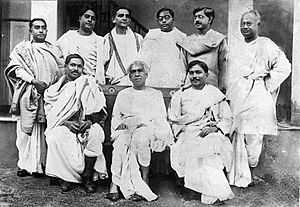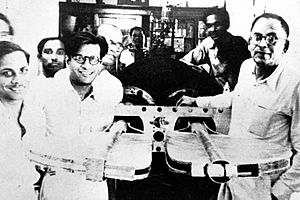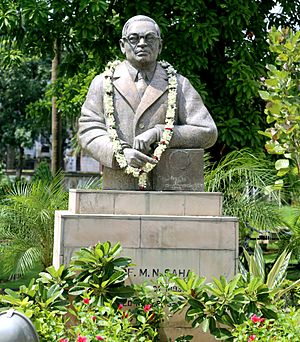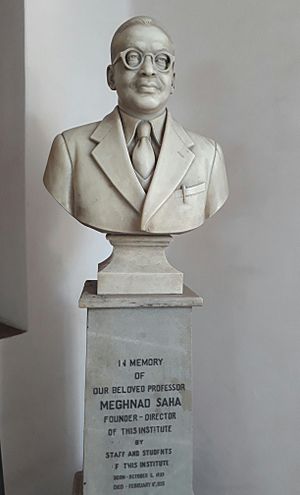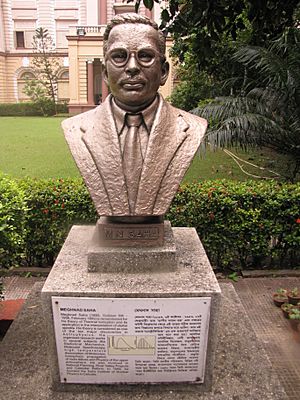Meghnad Saha facts for kids
Quick facts for kids
Meghnad Saha
|
|
|---|---|
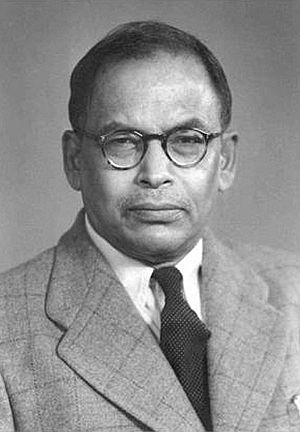 |
|
| Born | 6 October 1893 |
| Died | 16 February 1956 (aged 62) New Delhi, India
|
| Nationality | Indian |
| Alma mater | University of Calcutta Presidency University Rajabazar Science College |
| Known for | Thermal ionisation Saha ionization equation |
| Spouse(s) | Radha Rani Saha |
| Scientific career | |
| Fields | Physics, Astrophysics |
| Institutions | Allahabad University Rajabazar Science College University of Calcutta Imperial College London Indian Association for the Cultivation of Science |
| Academic advisors | Jagdish Chandra Bose Prafulla Chandra Ray |
| Doctoral students | Samarendra Kumar Mitra Daulat Singh Kothari |
| Member of Parliament, Lok Sabha | |
| In office 3 April 1952 – 16 February 1957 |
|
| Preceded by | Formed |
| Succeeded by | Ashoke Kumar Sen |
| Constituency | Calcutta North West |
| Signature | |
Meghnad Saha (born 6 October 1893 – died 16 February 1956) was a famous Indian astrophysicist. He created the Saha ionization equation. This equation helps scientists understand the chemical and physical conditions inside stars. His work made it possible for astronomers to figure out the actual temperatures of stars based on their light. He was also elected to the Parliament of India in 1952.
Contents
About Meghnad Saha
Meghnad Saha was born in 1893 in a village called Shaoratoli. This village was near Dhaka, in what was then British India. Today, it is part of Bangladesh. His father was a grocer, and his family was not wealthy. Meghnad worked hard to succeed in life.
Early Life and Education
When he was young, Meghnad had to leave Dhaka Collegiate School. This was because he took part in the Swadeshi movement, a protest against British rule. He later finished his school studies at Dhaka College.
He also studied at important colleges like Presidency College, Kolkata and Rajabazar Science College. Later, he became a professor at Allahabad University from 1923 to 1938. After that, he taught and led the Science Faculty at the University of Calcutta until he passed away. In 1927, he became a Fellow of the Royal Society, which is a very respected group of scientists. He also led the Indian Science Congress in 1934.
Some of Meghnad Saha's classmates were other famous scientists, like Satyendra Nath Bose.
His Passing
Meghnad Saha died on 16 February 1956 in New Delhi. He was on his way to a meeting when he collapsed. He had been suffering from high blood pressure for some time. He passed away at 10:15 AM. His body was cremated in Kolkata the next day.
Saha's Scientific Work
Meghnad Saha studied how elements become charged particles (ions) when they get very hot. This is called thermal ionisation. His research led him to create the Saha ionization equation.
The Saha Equation
The Saha equation is a key tool in Astrophysics. It helps scientists understand the light that comes from stars. By looking at the light from different stars, astronomers can find out their temperature. Then, using Saha's equation, they can figure out how much of each element in the star has become ionized. This helps them learn what stars are made of and how they work.
Saha realized that temperature is the most important factor in determining what a star's light looks like. He explained that his theory was a first step to understand what happens inside stars at very high temperatures.
Building Science in India
Saha also invented a device to measure the weight and pressure of sunlight. He helped create many important scientific places in India. These include the Physics Department at Allahabad University and the Saha Institute of Nuclear Physics in Kolkata.
He also started a science magazine called Science and Culture and was its editor until he died. He played a big role in setting up several scientific groups, such as the National Academy of Science (1930) and the Indian Physical Society (1934). The Saha Institute of Nuclear Physics, founded in 1943, is named after him to honor his contributions.
Saha's Role in Politics
Meghnad Saha wanted to help India develop. He believed that science and technology were very important for the country's progress. So, he decided to get involved in politics.
Member of Parliament
In 1951, Saha ran for election to the Lok Sabha, which is a part of the Indian Parliament. He wanted to help plan for education, industry, health, and river development. He won the election and became a Member of Parliament for North-West Calcutta.
In Parliament, Saha spoke a lot about important topics. These included education, helping refugees, atomic energy, and controlling floods. He was known for being very direct and thorough when pointing out problems. He wanted to see India become an industrialized nation.
His Vision for India
Saha once said that scientists are often seen as living in an "Ivory Tower," meaning they don't get involved in real-world problems. But he believed that science and technology are now as important for running a country as law and order. He got involved in politics because he wanted to use his knowledge to help his country.
He was a main person behind the plan for river development in India. He helped create the first plan for the Damodar Valley Project, which was a big project to manage rivers and floods.
Honoring Meghnad Saha
Many famous scientists have praised Meghnad Saha's work.
- Jayant Narlikar, a well-known astrophysicist, said that Saha's ionization equation was one of the top ten achievements in 20th-century Indian science. He even thought it was worthy of a Nobel Prize.
- Svein Rosseland, another scientist, said that Saha's work greatly boosted astrophysics. He felt that almost all progress in the field after Saha was influenced by his ideas.
- Daulat Singh Kothari, one of Saha's students, described him as a very simple and humble person. He said Saha was a man of great courage, strong will, endless energy, and dedication.
Images for kids
See also
 In Spanish: Meghnad Saha para niños
In Spanish: Meghnad Saha para niños
 | Mary Eliza Mahoney |
 | Susie King Taylor |
 | Ida Gray |
 | Eliza Ann Grier |


